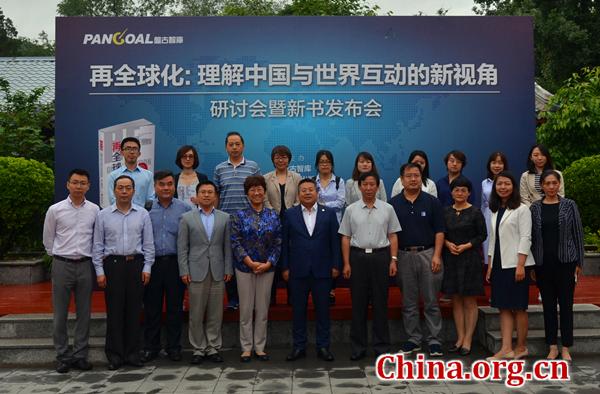New book on changing relationship between China and world
- By Zhang Rui
 0 Comment(s)
0 Comment(s) Print
Print E-mail China.org.cn, May 22, 2018
E-mail China.org.cn, May 22, 2018

A new book which explores how China should maintain and improve its relationship with the rest of the world has been published in Beijing.
At the book launch for "Re-globalization: When China Meets the World Again" held in Beijing on May 17, the author Wang Dong said that the globalization will not diminish, but rather enter a new stage.
Wang Dong is the executive deputy director of the Institute for China-U.S. People to People Exchange at Peking University and the secretary-general of Pangoal Institution, a leading China-based public policy think tank. He is co-author of the book with Cao Dejun, a PhD student from the School of International Studies of Peking University.
According to the Social Sciences Academic Press, since the reform and opening up, China has made remarkable achievements in development and the rise of China will surely lead to a new round of globalization. When China, as a rising power, meets the world again, the old form globalization must expand and upgrade, to usher in the "re-globalization" process. In this context, this new book has received great attention from political and academic circles in China.
The book creatively and systematically develops the theoretical framework of "re-globalization," and profoundly explains the relationship between China and the world in the future, providing theoretical support for China's peaceful rise, and fills in the cognitive gap between China and foreign countries, the publisher said, adding that the book has made predictions and visions for a great many issues involved in "re-globalization."
"Western countries once thought that globalization is nearly dead, and the world will once again get back to an order dominated by geopolitics. Although overall geopolitics has a tendency to return, globalization will not perish, but will enter a new stage," Wang Dong said.
According to Wang Dong's analysis, this new stage refers to the reform of the process of globalization by emerging countries represented by China, and the effects of model upgrading of such reform and the effects of its expansion.
"First, it is not about 'winners take it all' any more, but about various countries shaping and formulating rules together," he stated, "Second, upgrade and expand the old globalization system; Third, this process is 're-globalization' rather than 'new globalization.' China does not seek to 'start anew' or overthrow the existing system, it wants to reform and upgrade the current system. Fourth, it develops in an inclusive, shared, consultative, win-win, and balanced manner."
Wang said that the book theoretically discusses the rationality and legitimacy of China's provision of public products as an emerging power and analyzes China's practical role in promoting a new round of economic globalization by looking at the Belt and Road Initiative, the Asian Infrastructure Investment Bank (AIIB), Alibaba Group's global innovations, and the innovative experiments on China's free trade zones. The book eventually offers a road map of a long-term vision for China to lead the "re-globalization" strategy.
The publisher told China.org.cn that the English edition of "Re-globalization: When China Meets the World Again" will be published this year.
Li Yanling, a director of the international branch of the Social Sciences Academic Press, believes this book has both academic and social value and will help change the bias against China of the Western world.






Go to Forum >>0 Comment(s)